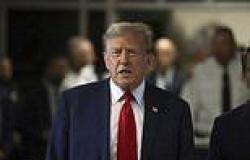Welcome to 2020 Vision, the Yahoo News column covering the presidential race. Reminder: There are 234 days until the Iowa caucuses and 507 days until the 2020 presidential election.
On Thursday, the Democratic National Committee released the twenty participants for the first debates of the 2020 primary, set to occur in Miami the nights of June 26 and 27. The DNC had laid out criteria in January for qualifying: At least one percent in three approved polls (either national or of early states) and/or 65,000 donors, with candidates who hit both marks securing a spot.
There has been some criticism that the rules were flawed. Montana Gov. Steve Bullock and Massachusetts Rep. Seth Moulton failed to make the cut while entrepreneur Andrew Yang and spiritualist author Marianne Williamson did, but campaigns have known the rules for most of the year. In March, Yahoo News reported on the efforts of Yang and South Bend Mayor Pete Buttigieg — at the time considered a dark horse, now generally placing in the top five of most polls — to reach 65,000 donors.
“We set forth the rules early,” Tom Perez, the party chairman, said this week. “We communicated them clearly to everybody. We got no objections when we communicated the rules of participation.”
Here’s the full list of candidates who qualified, with those who hit both the polling and fundraising marks in bold. Those not in bold qualified via polling:
While the DNC said its intention was to split up the groups evenly so there wasn’t a so-called “varsity” and “junior varsity” debate, the nights ended up lopsided, with one Warren on one night and the rest of the current favorites — Biden, Buttigieg, Harris, Sanders — on another.
Candidates who failed to qualify for June’s debates will still have a chance to make it for the follow-up, July 30 and 31 in Detroit. After that, the qualifications get tougher for the third set of debates in September: Have 130,000 donors by the end of August and hit two percent in four approved polls.
The June debates will air on NBC News, MSNBC and Telemundo. Considering the debates will be 120 minutes each, split among 10 candidates, minus time for commercials and questions, candidates will need to plan for limited time to make their mark in a crowded field.
In an interview with his favorite morning television show Friday, President Trump gave his latest assessment of the 2020 Democratic presidential field — replete with insults both new and old.
"Everybody knows Joe [Biden] doesn't have it," Trump said on "Fox & Friends." "Now I see that Pocahontas [Trump's disparaging nickname for Elizabeth Warren] is doing better. I would love to run against her, frankly. I see that Bernie Sanders is not doing well at all. I don't see the other ones [winning the Democratic nomination]. I really don't see it. They talk about Kamala. I don't see Kamala. I don't see — I think it's probably between the three of them [Biden, Warren and Sanders]. Mayor Pete [Buttigieg], I don't see at all. I think that's a joke."
While Trump may mock his would-be opponents, a Quinnipiac University poll released this week found all five leading him among voters nationally:
• Biden (53 percent); Trump (40 percent)
• Sanders (51 percent); Trump (42 percent)
• Harris (49 percent); Trump (41 percent)
• Warren (49 percent); Trump (42 percent)
• Buttigieg (47 percent); Trump (42 percent)
Elizabeth Warren speaks during a town hall event in Oakland, Calif., last month. (Stephen Lam/Reuters)
MoreTrump isn't afraid of Warren. But he should be.
Sen. Elizabeth Warren, whose presidential campaign almost self-destructed before it began over her clumsy use of DNA testing in a pointless argument about whether she is descended from Native Americans, has picked herself up in the race for the 2020 Democratic nomination. Yahoo News’ Jerry Adler explains why her rise should scare Trump:
Warren is a tenacious campaigner but an inexperienced candidate who got rattled by Donald Trump’s “Pocahontas” gibes; she has a compelling personal narrative as a child of the working class who rose to Harvard and the U.S. Senate, but she can’t seem to sell it convincingly to voters; her attempts to project homeyness come off as forced and self-conscious. She has risen by her own tenacity, a detailed and coherent set of policy ideas, and her uncanny ability to persuasively explain and defend them to voters.
And that would seem to make her a natural as a candidate to challenge the most policy-ignorant, belligerent and verbally incoherent president in American history.
[...]
There’s a characteristic Democratic fatalism in the conviction that the country won’t vote for a female president, barely a decade after it elected a black man with an exotic name and background. If Barack Obama had lost the election, we would be hearing from Democrats who say they like Cory Booker but are supporting someone else because, you know, 2008. Warren’s persistent climb in the polls after having been written off at the start is the best response to that kind of argument. But for her and all the women running this year, “2008” should be the discussion-ending answer to the assertion that “the American people will never elect an ‘X’ president,” where X is some category other than "white man."
Warren may have other obstacles to overcome, such as her asserted lack of “likability,” which is an occupational hazard faced by many female candidates, caught between the need to come across as a plausible leader of the free world and the rule that women shouldn’t discomfit male voters by appearing too smart or assertive. But I call BS on that idea, which ought to have disappeared along with red-tipped Marlboros that don’t show lipstick smudges. Smart and assertive is Warren’s brand. If she’s going to win, it will be on those qualities.

Beto O'Rourke participates in the Capital City Pride Fest Fun Run 5K in Des Moines, Iowa, Saturday. (AP Photo/Charlie Neibergall)
MoreBeto says he’s unfazed by sinking poll numbers
Beto O'Rourke is currently polling at just 2 percent in Iowa, well behind former Vice President Joe Biden (24 percent), Vermont Sen. Bernie Sanders (16 percent), Massachusetts Sen. Elizabeth Warren (15 percent) and South Bend, Ind., Mayor Pete Buttigieg (14 percent).
But the former Texas congressman told Yahoo News that he's not too concerned.
“There is a lot of time before the Iowa caucuses. We've never been guided by a poll before, “ O’Rourke said Saturday at the opening of his Cedar Rapids field office. “If you were to look at the Texas Senate race, the first couple of months after we were in [the primary], no poll was going to say that we were going to win. When I first ran for Congress in 2012, against an incumbent and against some very long odds no poll at any point said that we were going to win. And yet we did. And if I am lucky enough to to be the nominee and then to become the president of the United States, no poll will guide the decisions that I make.”
He added: “I’m going to continue to meet with people to show up to listen, to learn to include as many people as I can, not just into our campaign, but into our democracy at this defining moment of truth for the country.”

Rep. Justin Amash, R-Mich., holds a town hall meeting in Grand Rapids last month. (Photo by Bill Pugliano/Getty Images)
MoreHouse primaries heat up
While the presidential race has understandably sucked up most of the oxygen in the primary room, there will be 469 federal legislative races next year in the House and Senate. Two House races, one on each side of the aisle, stood out this week as interesting.
Rep. Justin Amash, of Michigan’s 3rd District in the western section of the lower peninsula, has become a Republican target after voicing support for an impeachment inquiry into Trump. State representative Jim Lower has already announced his intention to primary Amash, and a poll released this week showed the incumbent trailing. https://twitter.com/DonaldJTrumpJr/status/1139140284707721218 along with the implication he’d be on the trail in support of Lower, writing, “See you soon Justin... I hear Michigan is beautiful during primary season.”
Amash then retweeted the president’s son with “if it's what you say I love it especially later in the summer,” a reference to the email Trump, Jr. sent setting up a meeting with a representative of the Russian government at Trump Tower in June 2016.
On the Democratic side, the progressive group that backed Rep. Alexandria Ocasio-Cortez’s insurgent campaign has found a challenger for Rep. Henry Cuellar, a Texas moderate in the state’s 28th District. The Justice Democrats have selected Jessica Cisneros, a 26-year-old immigration and human rights attorney to take on Cuellar. Cisneros is off to a strong start in her fundraising, as the https://twitter.com/GideonResnick/status/1139533614306267136 that she raised $80,000 on the first day of her campaign.
Attempts to unseat incumbents are generally longshots, but if Cisneros gets the support of some of the sitting Justice Democrats — Ocasio-Cortez, but also Rep. Ilhan Omar of Minnesota and Rep. Rashida Tlaib of Michigan — she could get national attention for her challenge. For their part, establishment Democrats have attempted to protect incumbents, with the Democratic Congressional Campaign Committee (DCCC) announcing earlier this year it would blackball any consultants that work with primary challengers.
How old is too old to be president?
If current polling is an indication, voters in 2020 may be choosing between the oldest pair of candidates in an American presidential election. Yahoo News’ Mike Bebernes breaks down the looming debate over age:
President Trump is 73. His leading challengers thus far on the Democratic side, Joe Biden and Bernie Sanders, would be 78 and 79 respectively, at the start of their first term. Elizabeth Warren will be 71 on Inauguration Day. Each of the four would be the oldest president ever at the end of a potential second term.
At the same time, the Democratic field features some of the youngest candidates to mount a serious presidential campaign. At 37, Mayor Pete Buttigieg, of South Bend, Ind., would be the youngest president ever, if elected. The Constitution requires a president to be over age 35, but there's no age limit for the position.
But the possibility that the next president will be over 70 has raised concerns on multiple fronts. Some worry that someone of advanced age would struggle to physically manage the rigors of the job. Others raise the possibility of the president experiencing mental decline while in office.
Outside of fitness for the position, some also question how effectively a president from the baby boom generation would represent voters who increasingly come from younger generations. One Democratic consultant called the issue "the 78-year-old elephant in the room.”
That view is countered by those who say candidates should be judged individually for their ability to meet the challenges of the presidency. The grueling campaign schedule and large number of debates will give each person the opportunity to prove their vigor, they argue. Others contend that to assume an older person will suffer from Alzheimer's disease or dementia is to resort to ageism.
Verbatim
"If you don't hear what it is, you don't know what it is."
— President Trump, on "Fox & Friends," attempting to clarify his stunning admission that he would accept damaging information against his political rivals from foreign governments without necessarily alerting the FBI
“I would support impeachment proceedings beginning now."
— Sen. Amy Klobuchar, https://twitter.com/NewDay/status/1139498475811328001, after President Trump said he would listen if a foreign power offered dirt on a 2020 political rival
"We must recognize that in the 21st century, in the wealthiest country in the history of the world, economic rights are human rights. And that is what I mean by democratic socialism.”
— Sen. Bernie Sanders in a speech this week on the label disparaged by conservatives and at least one Democratic hopeful
"Democrats must say loudly and clearly that we are not socialists. If we do not, we will be helping to reelect the worst president in this nation’s history.”
— Former Colorado Gov. John Hickenlooper, in Washington, D.C., responding to Sanders' embrace of democratic socialism
“Of course I could.”
— Anita Hill, on NBC, when asked whether she “could conceive” of casting a ballot for former Vice President Joe Biden
"We have our own Jackie O today, it's called Melania."
— President Trump, on "Fox & Friends," when asked to defend his decision to change the iconic Air Force One paint job devised under the former first lady Jacqueline Kennedy Onassis

Read more original 2020 coverage from Yahoo News:
all right reserved for yahoo news











